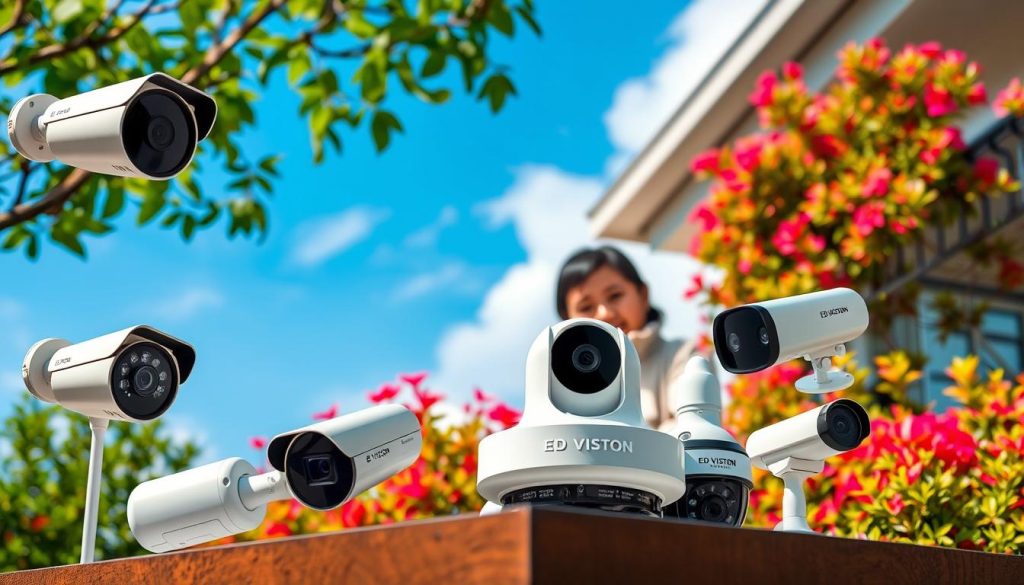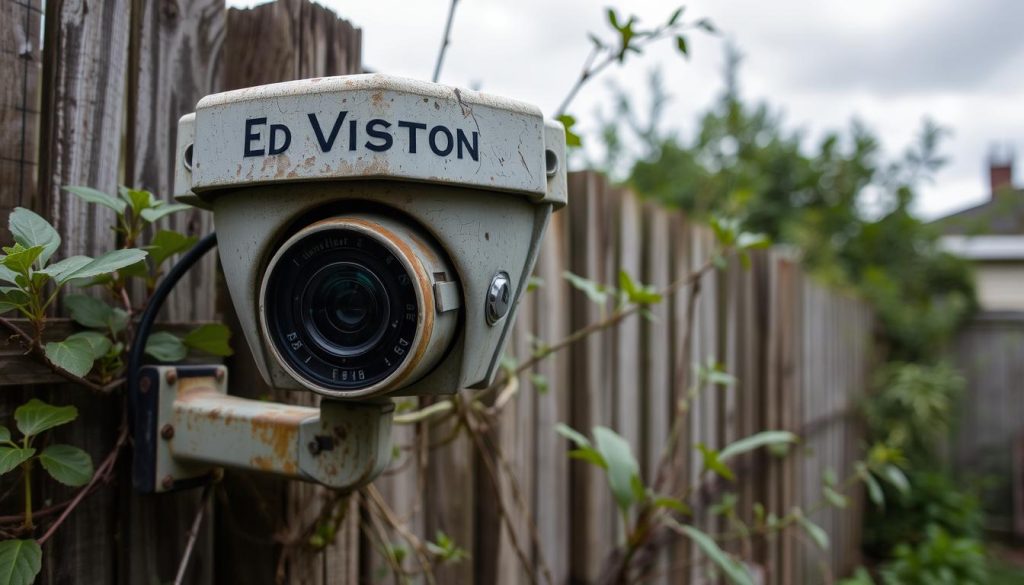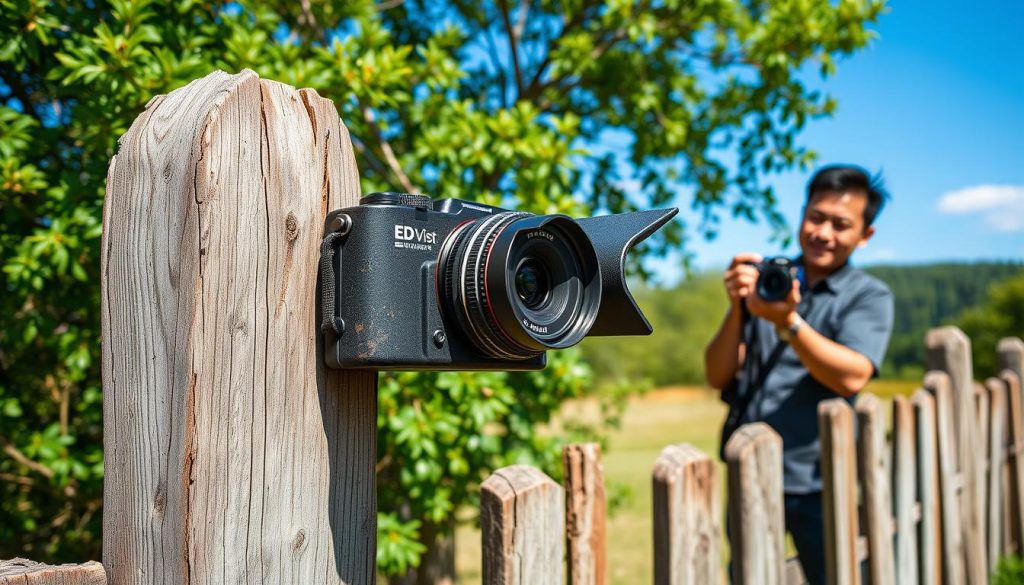Ever wondered why some outdoor cameras last forever, while others fail quickly? The lifespan of outdoor cameras depends on many factors. These factors affect their durability and how well they work. Knowing these factors is key for homeowners and businesses in Singapore wanting better security.
In this article, we’ll dive into the world of outdoor camera longevity. We’ll look at how long different types last, common problems that can shorten their life, and ways to make them last longer. If you’re thinking about getting new cameras, call ED Viston today at +65 8313 4578. They can tell you about the latest CCTV solutions and deals.
Key Takeaways
- The average lifespan of outdoor cameras ranges from 5 to 10 years, depending on the type and maintenance.
- IP cameras typically last around 3-5 years, while analog cameras can endure 5-10 years.
- Cameras should be cleaned 2 to 3 times a year, specially in harsh weather.
- High-quality cameras can last over 10 years with proper care and regular updates.
- Environmental factors and maintenance practices play a critical role in determining outdoor camera longevity.
Understanding Outdoor Camera Durability
Outdoor camera durability is key for long-term surveillance. These cameras’ lifespan depends on their materials, parts, and how well they handle the weather. Top-notch outdoor cameras have strong housings and special coatings to fight off dust and corrosion.
Companies like Avigilon make security cameras that can last five to ten years. It’s important to pick a camera with a high IP rating, like IP65 or higher, for better weather resistance. Cameras with moving parts, like PTZ models, need more upkeep and might not last as long as fixed-lens cameras.
Keeping your cameras in good shape is vital. Clean the lens, check for loose connections, and update the firmware regularly. Also, having a pro install your cameras ensures they work best and last longer.
In short, choosing quality cameras, knowing how weather affects them, and keeping them maintained can make them last for many years.
To learn more about CCTV solutions and deals, call ED Viston today at +65 8313 4578.
Factors Influencing Lifespan of Outdoor Cameras
The life of outdoor cameras can change a lot based on several key factors. Knowing these can help users choose the right security solutions. To figure out how long outdoor cameras last, look at their quality, the weather, and how well they are taken care of.
Quality of Cameras and Components
Cameras made with top materials and parts last longer. High-end cameras, like the Reconeyez system, can handle tough weather. They can last much longer than cheaper ones, which often break easily.
Brands like LS VISION Technology Co., Ltd. focus on making cameras that are reliable and last. They make sure their cameras meet high standards.
Impact of Environmental Conditions
Outdoor cameras face many challenges, from strong sun to cold and wet weather. These conditions can really affect how long a camera lasts. Cameras built for harsh weather, like those with an IP67 rating, can last longer.
Checking the area for dangers can also help keep cameras working longer.
Usage Patterns and Maintenance
How you use your outdoor cameras matters a lot. Using them a lot, or in bad weather, can make them wear out faster. Keeping them clean and updating their software helps them work better.
Cameras that are well looked after can keep working well for a long time. Neglecting them can cause problems that shorten their life.
If you want the latest in security tech, call ED Viston at +65 8313 4578. They offer CCTV solutions and deals that fit your needs.
How Long Do Outdoor Cameras Last?
The lifespan of outdoor cameras varies a lot. It depends on the camera type and its parts. Knowing how long different cameras last helps users choose the right security.
Many things affect how long an outdoor camera lasts. These include the camera’s design, the weather, and how well it’s taken care of.
Average Lifespan of Different Types
Different outdoor cameras last for different times:
| Camera Type | Average Lifespan | Key Considerations |
|---|---|---|
| Analog Cameras | 5-10 years | Fewer moving parts, simpler design |
| IP Cameras | 3-5 years | More advanced electronics, higher quality may last longer |
| NVR/DVR Devices | 5-10 years | Maintenance and environmental factors affect lifespan |
| Wireless Cameras | 1-3 years (batteries) | Battery type and usage frequency play a significant role |
| Trail Cameras | 3-5 years | Durability focused for outdoor use |
Comparing Analog vs. IP Cameras
Analog cameras usually last longer than IP cameras. They can last from 5-10 years because of their simple design. On the other hand, IP cameras last 3-5 years because of their complex electronics.
Even though IP cameras don’t last as long, they offer better image quality. This makes them a good choice for many people.
For advice on the latest security solutions, call ED Viston today at +65 8313 4578. They can help you find the best options for your needs.
Common Issues Affecting Outdoor Camera Longevity
Outdoor cameras can face many challenges. Knowing these issues helps users choose better surveillance systems. This knowledge is key for cameras to work well and last long.
Technological Advancements and Obsolescence
New tech can make old cameras outdated fast. Even if they work, new tech might make them obsolete. It’s smart to keep up with camera tech to avoid wasting money.
Weather-Related Damage
Weather can really hurt outdoor cameras. They’re made to handle different weather, but extreme conditions can damage them. Look for cameras that can handle really cold temperatures to keep them working in harsh weather.
Physical Wear and Tear
Cameras get worn out over time. Parts can break down from weather or use, leading to bad pictures or not working at all. Keeping them clean and checked regularly can help them last longer. Professional cameras can last 7+ years with the right care, while consumer ones might only last 2-3 years.
If you want to make your surveillance system last longer, call ED Viston today. They offer the latest CCTV solutions and deals at +65 8313 4578.
Maintenance Tips for Prolonging Camera Lifespan
Keeping outdoor cameras in good shape is key to their long life and best performance. A few simple steps can make them last longer and work better. Here are some important tips for taking care of your outdoor cameras.
Regular Cleaning Techniques
Cleaning the camera lenses and body should happen every 2-3 years. This is more important in places with lots of dust or pollen. Use soft cloths and gentle cleaners to avoid harm.
Regular cleaning keeps cameras working well and improves picture quality. This makes your security system more effective.
Firmware Updates and Software Maintenance
Updating the camera’s firmware keeps it running smoothly. It makes the camera more secure and functional. Always check for updates to keep your camera in top shape.
This step is vital for keeping your camera running well. It ensures all features work as they should.
Environmental Protection Strategies
Using covers and shields protects cameras from bad weather and extreme temperatures. Make sure they are installed right to avoid damage. Proper protection reduces the need for repairs and extends camera life.
| Maintenance Activity | Frequency | Purpose |
|---|---|---|
| Clean camera lenses | Every 2-3 months | Enhance image quality |
| Update firmware | Quarterly | Improve functionality |
| Check environmental protection | Seasonally | Prevent weather-related damage |
| Inspect wiring | Every 6 months | Safeguard against technical failures |
| Backup video footage | Monthly | Prevent data loss |
Following these tips can help your cameras last longer. For more advice and the latest in CCTV, call ED Viston at +65 8313 4578. They have great offers coming up.
Choosing the Right Outdoor Security Camera
Choosing the right outdoor security camera is important. You need to look at performance and durability. Knowing what to look for ensures you get the best camera for your needs.
Features to Look For
When choosing outdoor security camera, consider these key features:
- Resolution: Look for at least 1080p video resolution. It’s clear enough to spot threats. For even better detail, choose 4K.
- Weather Resistance: Choose cameras with an IP65 rating or higher. They work well in bad weather.
- Night Vision Capability: Night vision is key, as 42% of break-ins happen at night. Full-color night vision is a big plus.
- Field of View: A 120° to 180° field of view is best. It covers more area.
- Durable Materials: Go for cameras made of quality aluminum or weather-resistant plastic. They last longer.

Cost vs. Quality Considerations
When looking at prices, balance cost with quality. Brands with good customer support and reliable products save money in the long run. Spending more on a quality camera means better security and fewer repairs.
To see options for your needs, check this resource. It talks about advanced outdoor surveillance.
For more info and the latest CCTV solutions, call ED Viston at +65 8313 4578.
Best Practices for Outdoor Camera Installation
Effective outdoor camera installation is key for top-notch surveillance and security. By placing cameras right and securing them, you boost safety. The right camera system meets your specific security needs, whether at home, work, or public areas.
Optimal Placement Tips
Positioning outdoor cameras wisely is vital for their success. Here are some tips for the best placement:
- Mount cameras at 8 to 10 feet to stop tampering and get a clear view.
- Focus on key spots like doors, driveways, and hidden areas. This fills in surveillance gaps.
- Use passive infrared sensors to catch motion up to 20 feet away.
- Add more cameras at important entry points, as eufy and Arlo suggest.
- Think about your area’s layout. Big brick walls can block wireless signals, so wired might be better.
Securing Against Vandalism
To keep your outdoor cameras safe, take these steps:
- Go for tamper-proof mounts that are hard for intruders to get to.
- Choose housings that can handle vandalism and bad weather.
- Avoid placing cameras where they’re easy to see to prevent vandalism.
For advice that fits your needs, contact Wenhong. They’re experts in setting up surveillance systems to keep threats away.
Choosing the right outdoor camera setup boosts your surveillance. Remember, regular upkeep and watching the cameras is key for them to work well.
For more on security solutions, call +65 8313 4578 today. Learn about the latest CCTV options and keep your place safe.
Signs Your Outdoor Camera Needs Replacement
Keeping your outdoor cameras in top shape is key. Spotting when they need a new one can boost your security. Look out for certain signs to know when it’s time for a swap.
Detection of Image Quality Degradation
When your camera’s images start to blur or get fuzzy, it’s a red flag. Poor video quality can make your surveillance less effective. If your camera’s feed is always unclear, it might be time for a new one.
Frequency of Technical Issues
Constant problems with your camera can be a big worry. If it keeps cutting out or losing signal, your security is at risk. Getting a reliable camera can give you peace of mind and better protection.
Physical Condition of the Camera
Check your camera’s physical state. Look for signs like exposed wires, broken housing, or a scratched lens. If your camera looks worn out, it’s likely time for a replacement. Keeping your camera in good shape is essential for ongoing security.

| Signs of Replacement | Description |
|---|---|
| Image Quality Issues | Fuzzy or distorted images indicating poor quality. |
| Technical Failures | Frequent disconnections or failure to record footage. |
| Physical Damage | Visible wear, exposed wires, or cracked glass requiring attention. |
Staying alert to these signs helps your security system work best. For the latest in CCTV tech and deals, reach out to ED Viston at +65 8313 4578.
Comparative Lifespan of Different Camera Types
It’s important to know how long different cameras last before buying one. Each camera type has its own durability level, which affects how long it lasts. By understanding these lifespans, you can choose the best camera for your needs.
Analog Cameras
Analog cameras usually last 5 to 10 years. Their lifespan depends on how well they’re made and the environment they’re in. These cameras are simple and easy to use but can get damaged by weather. Keeping them in good shape can help them last longer, but new tech might make you want to get a newer model sooner.
IP Cameras
IP cameras typically last 3 to 5 years. But, the best ones can last up to 10 years with the right care. They offer great image quality and connectivity, making them popular for today’s surveillance needs. It’s important to keep them updated and protected from the environment to make them last longer.
NVR/DVR Systems
NVR and DVR systems can last 5 to 10 years, depending on how they’re used and cared for. Their lifespan should match the cameras they work with for the best performance. Choosing high-quality storage can make them more durable and reliable, perfect for long-term monitoring.
Choosing a camera type means considering more than just how long it lasts. You also need to think about what you want to watch and where the camera will be. For personalized advice and the latest deals, call ED Viston at +65 8313 4578 today.
Extending Your Camera’s Lifespan
Outdoor security cameras are key for safety and watching over your space. To make them last longer, you can follow some tips. These steps help extend the life of your outdoor cameras.
Investing in Quality Equipment
Choosing high-quality cameras means they’ll last longer. Spending more on good equipment pays off in the long run. These cameras can last for years, or even a decade, without needing to be replaced often.
Look for brands that use advanced tech. This includes weatherproof housing and reliable power supplies. These features help your system last longer.
Regular Maintenance and Checks
Keeping up with maintenance is a must. Regular checks, like cleaning the lenses and ensuring the camera is aligned, boost performance. By doing this, you can avoid problems caused by wear and the environment.
Being proactive with maintenance helps your cameras last longer. It also makes sure they work well.
If you’re thinking about updating your CCTV system or need reliable installation, call ED Viston today. Dial +65 8313 4578 to learn more about the latest CCTV solutions and deals in Singapore.
Conclusion
Knowing how long outdoor cameras last is key for good security. Their lifespan depends on the parts they’re made of, the weather, and how well you take care of them. By choosing good quality and keeping them up to date, you can make them last longer.
It’s also important to think about how long you need to keep your security footage. This can range from 7 to 90 days. So, make sure your system can store what you need.
If you’re in Singapore and want better security, call ED Viston at +65 8313 4578. They offer top-notch CCTV systems that fit your needs. They can help you choose the right cloud storage or high-capacity systems for keeping footage longer.
Choosing the right outdoor cameras and taking care of them is important. It helps protect your place for a long time. By focusing on quality and maintenance, you can keep your surveillance working well. This gives you peace of mind in a world with more security challenges.
FAQ
How long do outdoor cameras typically last?
What factors influence the durability of outdoor cameras?
Can extreme weather conditions affect outdoor camera longevity?
How can I prolong the lifespan of my outdoor security cameras?
Are there specific signs indicating that my outdoor camera needs replacement?
What should I look for when choosing an outdoor security camera?
Why is regular maintenance important for outdoor cameras?
What is the difference in lifespan between analog cameras and IP cameras?
Source Links
- https://envysion.com/industries/convenience-store-industries/security-cameras-life-expectancy/
- https://reolink.com/blog/how-long-do-cameras-last/?srsltid=AfmBOop_3UVf5oFfy62JhDAlpRd0Bojz19R23kBXndTpRqMSPVczaZyg
- https://mammothsecurity.com/blog/how-long-security-cameras-last
- https://reolink.com/blog/how-long-do-cameras-last/?srsltid=AfmBOooSuCBs_hBSars5fwi9r1ZMzAVQshy097HiZNOZrJHZluIOO3Ff
- https://www.lvt.com/blog/guide-to-outdoor-security-cameras
- https://reconeyez.com/us/security-camera-life-expectancy/
- https://www.lsvisionsolar.com/the-lifespan-of-surveillance-camera-outdoor/
- https://reolink.com/blog/how-long-do-cameras-last/?srsltid=AfmBOorNU2eoRGRTh4TMbsFsOANEpRo_6UNZREaX80c3Jo-2CZ4Ek4Vw
- https://reolink.com/blog/how-long-do-cameras-last/?srsltid=AfmBOopUagPUcITRMyrzq-yPPstv4ObYvw6b8q3Zzm8Qm_ipbOsN1Gsn
- https://brinkshome.com/smartcenter/how-long-do-security-cameras-last
- https://www.xlrsecurity.com/blog/how-long-do-security-cameras-typically-last/
- https://reolink.com/blog/how-long-do-cameras-last/?srsltid=AfmBOor_qHY3bNh5vVwet_IYTuDBm1FO32g1IaT2a_B-yyqqWhP8CxeH
- https://www.lorddecor.com/blog/understanding-the-lifespan-of-security-cameras-maintenance-tips-and-guidelines
- https://datamyte.com/blogs/cctv-maintenance/
- https://www.deepsentinel.com/blog/choose-weatherproof-cameras-outdoor-security/?srsltid=AfmBOoo6vg9dKRGHxLjvKavfwEt-APgHnACz2UghA4o0RAo9yEKzYuyE
- https://www.tp-link.com/ph/blog/1795/what-kind-of-outdoor-security-camera-should-i-buy-/
- https://www.security.org/security-cameras/best/outdoor/
- https://butterflymx.com/blog/cctv-installation/
- https://www.techradar.com/how-to/security-camera-installation-8-tips-from-the-pros
- https://www.alliedhomesecurity.net/news/tips-for-home-security-camera-installation/
- https://amarok.com/blog/8-signs-its-time-to-upgrade-your-security-cameras/
- https://edgebusinesssecuritycameras.com/signs-your-security-camera-system-needs-maintenance
- https://www.cctv-camera.com.sg/articles/when-should-you-consider-upgrading-your-cctv-cameras.html
- https://www.better-digital-photo-tips.com/how-long-does-a-dslr-last.html
- https://cctvcameravision.com/which-type-of-cctv-camera-is-best-for-home-and-why/
- https://www.nytimes.com/wirecutter/reviews/best-wireless-outdoor-home-security-camera/
- https://www.jcchelp.com/how-long-security-cameras/
- https://www.inspiredcctv-ne.co.uk/2024/09/20/what-is-the-lifespan-of-a-cctv-system/
- https://reolink.com/blog/how-long-do-security-cameras-keep-footage/?srsltid=AfmBOore87RgzS2YgWQB7y3NGR6PjFjZ9T_ngcSgD5fwJSPgNz_HwJqk
- https://wuuklabs.com/blogs/home-security-camera/understand-battery-lifespan-for-your-wireless-security-cameras?srsltid=AfmBOopXgkTHQ1ZNuvSt7O2yD7P6hfFAWznzDbhkD6kRgArs5MDaVT73

